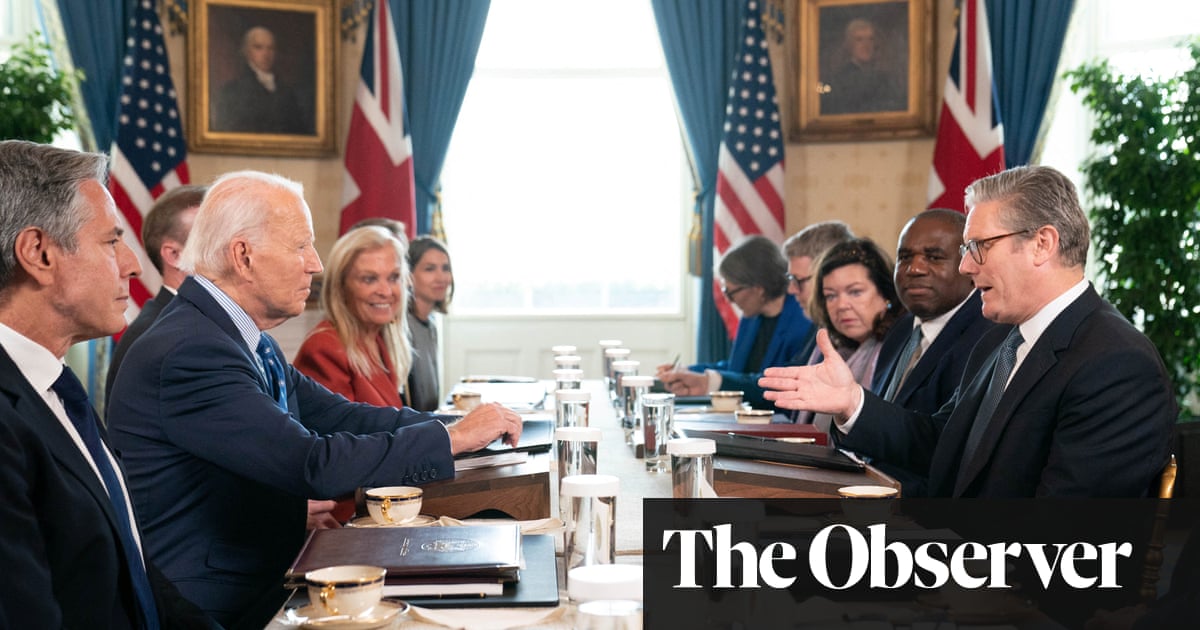World
Alarm in UK and US over possible Iran-Russia nuclear deal

Britain and the US have raised fears that Russia has shared nuclear secrets with Iran in return for Tehran supplying Moscow with ballistic missiles to bomb Ukraine.
During their summit in Washington DC on Friday, Keir Starmer and US president Joe Biden acknowledged that the two countries were tightening military cooperation at a time when Iran is in the process of enriching enough uranium to complete its long-held goal to build a nuclear bomb.
British sources indicated that concerns were aired about Iran’s trade for nuclear technology, part of a deepening alliance between Tehran and Moscow.
On Tuesday last week, Antony Blinken, the US secretary of state, made a similar warning on a visit to London for a summit with his British counterpart, David Lammy, though it received little attention, as the focus then was the US announcement of Iran’s missile supply to Moscow.
“For its part, Russia is sharing technology that Iran seeks – this is a two-way street – including on nuclear issues as well as some space information,” Blinken said, accusing the two countries of engaging in destabilising activities that sow “even greater insecurity” around the world.
Britain, France and Germany jointly warned last week that Iran’s stockpile of highly enriched uranium had “continued to grow significantly, without any credible civilian justification” and that it had accumulated four “significant quantities” that each could be used to make a nuclear bomb.
But it is not clear how much technical knowhow Tehran has to build a nuclear weapon at this stage, or how quickly it could do so. Working with experienced Russian specialists or using Russian knowledge would help speed up the manufacturing process, however – though Iran denies that it is trying to make a nuclear bomb.
Iran had struck a deal in 2015 to halt making nuclear weapons in exchange for sanctions relief with the US and other western nations – only for the agreement to be abandoned in 2018 by then US president and current Republican nominee Donald Trump.
Iran responded by breaching agreed limits on the quantity of enriched uranium it could hold.
Western concern that Iran is close to being able to make a nuclear weapon has been circulating for months, contributing to tensions in the Middle East, already at a high pitch because of Israel’s continuing assault on Hamas and Gaza.
Iran and its proxy in Lebanon, Hezbollah, are supporters of Hamas – and Tehran’s nuclear development is therefore viewed as a direct threat by Jerusalem.
Soon after Vladimir Putin launched the full-scale invasion of Ukraine, Iran began supplying Shahed delta winged drones to Moscow and helped Russia build a factory to make more to bomb targets across Ukraine. In April this year, Iran launched a Russian-style missile and drone attack aimed at Israel, though it was essentially prevented and stopped with the help of the US and UK.
Russia and Iran, though not historically allies, have become increasingly united in their opposition to the west, part of a wider “axis of upheaval” that also includes to varying degrees China and North Korea, reflecting a return to an era of state competition reminiscent of the cold war.
Last week in London, Blinken said that US intelligence had concluded that the first batch of high-speed Iranian Fath-360 ballistic missiles, with a range of up to 75 miles (120km), had been delivered to Russia.
Able to strike already bombarded frontline Ukrainian cities, the missiles prompted a dramatic reassessment in western thinking as well as fresh economic sanctions.
after newsletter promotion
Starmer flew to Washington late on Thursday to hold a special foreign policy summit with Biden at the White House on Friday, beginning with a short one on one in the outgoing president’s Oval Office followed by a 70-minute-long meeting with both sides’ top foreign policy teams in the residence’s Blue Room.
The leaders and their aides discussed the war in Ukraine, the crisis in the Middle East, Iran and the emerging competition with China.
Starmer brought along with him Lammy, Downing Street’s chief of staff, Sue Gray, and the UK’s national security adviser, Tim Barrow; while Biden was accompanied by Blinken and Jake Sullivan, the US national security adviser, among others.
Prior to the meeting, UK sources indicated that the two countries had agreed in principle to allow Ukraine to fire long-range Anglo-French Storm Shadow missiles into Russia for the first time. But Biden appeared to suggest the topic was one of the reasons for the face-to-face, saying to reporters: “We’re going to discuss that now,” as the meeting began.
There was no update after the meeting, partly to keep the Kremlin guessing. Any use of the missiles is expected to be part of a wider war plan on the part of Ukraine aimed at using them to target airbases, missile launch sites and other locations used by Russia to bomb Ukraine.
Britain needs the White House’s permission to allow Ukraine to use the missiles in Russia because they use components manufactured in the US.
Protocol dictated that Biden and Starmer – the only two present without printed-out name cards – did most of the talking, while the other politicians and officials present only spoke when introduced by the president or the prime minister.
Lammy was asked by Starmer to update those present on his and Blinken’s trip to Kyiv on Thursday to meet Ukraine’s president, Volodymyr Zelenskiy.
Shortly after the meeting, Starmer said the two sides had had “a wide ranging discussion about strategy”.










